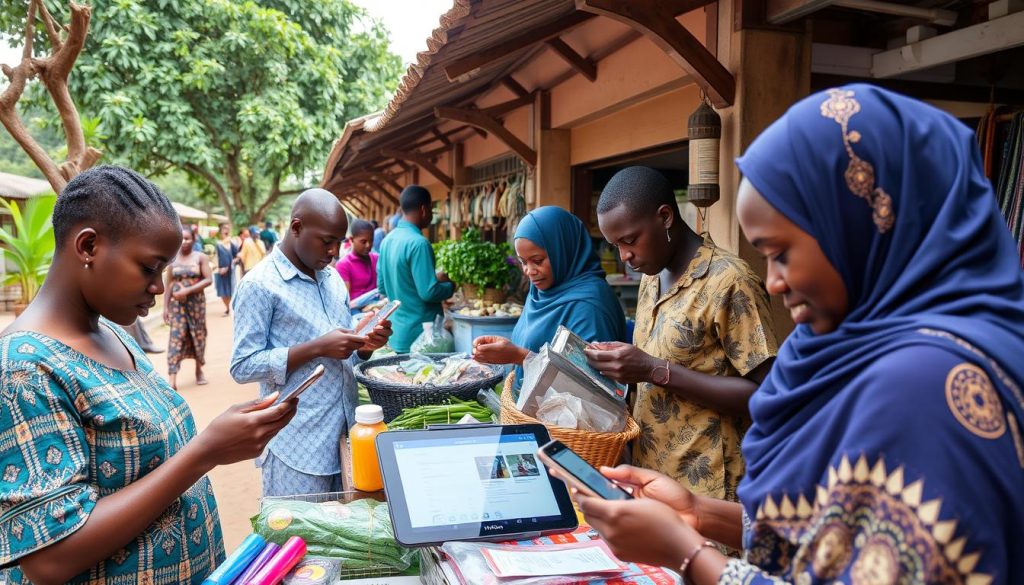In recent years, Africa has become a hot spot for starting businesses. It offers many chances for people to start profitable ventures with little money. From farming to tech, there are many opportunities for new businesses to grow.
These startups can help the economy grow. Starting a business in Africa can be very rewarding. With the right ideas and effort, anyone can find success in this exciting environment.
Understanding the Entrepreneurial Landscape in Africa

African entrepreneurship is fast-changing and full of life. It’s shaped by many things, like market trends and the business environment. Entrepreneurs are drawn to tech, agriculture, and renewable energy, seeing both hurdles and chances.
Demographics play a big role in entrepreneurship here. Young people, full of new ideas, push for fresh products and services. The mix of old ways and new business ideas is great for new entrepreneurs.
- Key sectors driving growth:
- Technology and innovation
- Agricultural advancements
- Renewable energy initiatives
- Challenges faced by entrepreneurs include:
- Limited access to capital
- Infrastructural deficits
- Regulatory barriers
- Opportunities available for entrepreneurs involve:
- Expanding markets for sustainable products
- Digital transformation enhancing business efficiency
- Collaboration with local communities
Entrepreneurs must stay quick on their feet. Adapting to changing markets can be the key to success. Knowing how the business environment in Africa is changing helps in planning for the future, leading to lasting growth.
The Benefits of Starting a Low Investment Business

Starting a low investment business has many advantages for aspiring entrepreneurs. It means less financial risk because you need less money to begin. This lets entrepreneurs test their ideas without a huge financial burden.
Another benefit is the chance for quick returns on investment. With less money needed at the start, businesses can make money faster. This means owners can use their earnings to grow even more.
Starting a low investment business also empowers individuals and the economy. It lets people take control of their financial future. This can inspire others in their communities, helping entrepreneurship grow across Africa.
Low Investment Business Ideas for Africa

Looking into low investment business ideas in Africa shows a lot of opportunities. Each industry has its own challenges and benefits. This helps entrepreneurs find the best ways to succeed.
Highlighting Sector-Specific Opportunities
Knowing the right sectors like agriculture, technology, and services is key. In agriculture, organic farming and aquaponics are becoming popular. They are sustainable and don’t cost much to start.
In technology, making mobile apps and digital marketing services are booming. This is because more people have smartphones and internet in cities. The services sector, like personal care and delivery, is also promising. It has low costs and high demand.
Market Demand and Target Audience
There’s a big change in market demand in Africa, towards health, convenience, and green products. The growing middle class wants healthier food and modern services. By understanding these needs, entrepreneurs can create products that meet them well.
Top Small Scale Agricultural Ventures

Small scale agriculture offers many chances for profit with little investment. Urban gardening is becoming popular, turning small areas into gardens. This helps local food security and promotes healthy eating.
Poultry farming is another good option, needing low start-up costs. With more people wanting organic and free-range eggs, small farms can make a lot of money. It’s important to choose quality breeds and manage well to get the best results.
Aquaculture is also a great choice in small scale agriculture. Fish farming can make money while meeting the growing need for seafood. Starting with freshwater fish is a good idea, as they are easier to care for and can bring good returns.
Vegetable farming is another good choice for local markets. Growing in-demand crops like tomatoes, peppers, and leafy greens can be very profitable. Using sustainable farming methods boosts productivity and attracts eco-friendly customers.
However, there are challenges to face. Effective pest control, finding markets, and managing money are key to success. Getting advice from experienced farmers and agricultural services can be very helpful.
With the right strategy, small scale agriculture can be a fulfilling venture. It opens up many opportunities for those ready to take on the challenge.
Leveraging Technology for Business Growth

Technology has become key for business growth in Africa. Entrepreneurs use mobile apps and e-commerce to improve operations and reach more people. These digital tools are changing how businesses work and connect with customers, especially where infrastructure is limited.
Mobile Applications and E-Commerce Platforms
Mobile apps have changed the business scene in Africa. They let companies serve customers directly, making things easier and more accessible. For example, Jumia has become a big name in e-commerce in Africa by offering a simple online shopping experience.
E-commerce in Africa is growing fast, thanks to more smartphones and internet. Entrepreneurs can use these mobile solutions to create new business models across different industries. Using mobile apps for payments and feedback can make businesses run smoother.
Success stories show the power of technology in business. Companies that use mobile tech often get ahead by engaging customers better, saving costs, and opening more sales channels. Entrepreneurs should use these tools to update their business and find new chances in their markets.
Service-Based Businesses: A Quick Start Approach

Starting a service-based business is a great way to begin with little money. In Africa, more people are taking up freelancing and consultancy. These paths let you use your skills without big costs.
Successful business owners know their strengths and offer services that people want. They focus on getting and keeping clients. This helps them do well in a competitive world.
Freelancing and Consultancy Services
Freelancing and consultancy in Africa are good ways to make money. You can use your skills or knowledge to start a business. Here are some good ideas:
- Digital marketing consultancy for local businesses aiming to enhance online presence.
- Freelance graphic design services catering to small enterprises.
- Online tutoring, leveraging academic strengths to reach a broad audience.
- Personal training or wellness coaching, utilising fitness expertise.
To get clients, you need to market and network well. Social media is great for getting seen. Going to local events can help you meet people in your field.
Knowing your niche and delivering good service helps you grow. This is key in the fast-changing world of freelancing and consultancy.
Crafting a Business Plan with Minimal Capital

Starting a business with little money is tough. Good business planning is key. It helps guide your startup to grow and succeed. A solid plan shows your vision and how to reach your goals.
Here are important parts of a low-cost business plan:
- Market Analysis: Knowing your industry and who to sell to is crucial. It makes your business more relevant.
- Financial Projections: Show what you expect to earn, spend, and need in funds. This keeps your business financially sound.
- Marketing Strategies: Find smart ways to reach people without spending too much.
- Resource Utilisation: Use what you already have wisely. This saves money and boosts your impact.
- Sustainability and Growth Planning: Plan for the long term. This ensures your business can grow and adapt.
By using these parts, new entrepreneurs can make a detailed plan. It’s all about being smart with money. The aim is to build a lasting business that brings fulfillment.
Exploring Eco-Friendly Business Ideas

Eco-friendly business ideas are on the rise in Africa. This offers great chances for entrepreneurs. They can tap into a market that values sustainability and cares for the environment. We’ll look at new eco-friendly business ideas, focusing on renewable energy and recycling.
Renewable Energy Solutions
Renewable energy is becoming key in Africa, both for need and profit. Companies using solar, wind, or bioenergy cut down on fossil fuel use. This meets the growing demand for green products.
By doing this, they help fight climate change. Renewable energy projects are not just good; they’re crucial.
Recycling and Upcycling Initiatives
There’s a big chance for recycling in Africa. Entrepreneurs can start programs to collect and process recyclables. Upcycling turns old materials into new, useful products.
This approach tackles environmental issues and makes money. It also meets the needs of eco-aware consumers. It helps create a more circular economy.
The Role of Community and Cooperative Ventures

In Africa, the business world is seeing the power of community and cooperative ventures. Small businesses are joining forces. They share their resources and skills to make more money and last longer.
Community projects are great at meeting local needs and giving people a say. They work together for a common goal. This way, everyone takes less risk.
Cooperatives in Africa show how working together can lead to success. For example, farmers in cooperatives can sell their produce better. They get better prices and easier access to markets.
These groups also help small businesses by offering support. By working together, communities can grow their economy. They encourage new ideas in local businesses.
By choosing community business models, Africa’s economy can grow. It also builds a sense of unity among entrepreneurs. This approach helps businesses thrive across the continent.
Online Education and Tutoring Services

The rise of online education in Africa has changed how students learn and get help. More people want flexible learning options. This means entrepreneurs can offer special tutoring services that meet specific needs.
These services help students do well in school and learn at their own speed. It’s a big step forward in education.
E-learning is now a big part of education. Many platforms offer interactive courses. This lets teachers teach students from anywhere.
Entrepreneurs can make online learning resources. These can include video lessons, quizzes, and mentoring sessions. It’s a great way to reach more students.
- Leveraging technology enables personalised learning experiences that cater to individual student preferences.
- Fostering community engagement through discussion forums enhances learner interactions and motivation.
- Implementing mobile-friendly designs ensures accessibility for students using smartphones and tablets.
In summary, the online education and tutoring services market is full of opportunities. By understanding what people need and using new technology, you can start a successful business. This can make a real difference in education across Africa, shaping the future of learning.
Creating Value with Food and Beverage Startups

The food and beverage business is full of opportunities for culinary entrepreneurs. It’s especially promising in areas with lots of local food production. Entrepreneurs can come up with new ideas to meet local needs and offer something unique.
Artisanal food production is a great choice for startups. It focuses on making high-quality, handmade products. This can include gourmet cheeses, breads, and preserves that use local ingredients and traditions.
Catering services also have a lot of potential. They can provide custom services for events like weddings, corporate gatherings, or community celebrations. By using local cuisine and seasonal ingredients, and offering a personal touch, you can attract clients who want real experiences.
Innovative beverages are also becoming popular. This includes drinks that show off local flavours, like herbal infusions, fruit-based drinks, or organic smoothies. These can appeal to health-conscious people and support local farming.
Quality and branding are key in this competitive field. Startups should invest in good packaging and a strong marketing plan. This plan should tell the story of the products. It helps build loyalty and sets the brand apart in a busy market.
The Importance of Networking and Partnerships

Networking is key for entrepreneurs to grow their businesses. It lets them share ideas, resources, and even get customer referrals. Building strong relationships can lead to better business performance and new opportunities.
Creating partnerships is another smart way to grow. By working together, entrepreneurs can share their strengths and resources. This reduces risks and increases chances of success. Local events like seminars and meet-ups are great for making these connections.
Online platforms have changed how we network. Social media and professional networks help entrepreneurs reach more people and form alliances worldwide. Being active in these communities builds trust and credibility, crucial for business owners.
Getting involved in the community is also important. Helping out in local initiatives can open up networking chances while helping the community. Working with local groups can lead to good partnerships and more visibility for your business.
Government Grants and Funding for Startups

Entrepreneurs in Africa often face big financial challenges when starting a business. Luckily, there are many programmes that offer government funding for startups. These help a lot with money and also encourage new ideas and growth.
Finding the right startup grants is key for a new business. Governments and private groups work together to offer different funding options. These options help meet the needs of businesses that don’t need a lot of money.
Here are important things to know about government grants and funding:
- Eligibility Criteria: Each grant has its own rules for who can apply. Knowing these rules helps entrepreneurs apply for the right grants.
- Application Processes: How to apply can differ a lot between funding bodies. You usually need to submit a detailed plan of your business, how much money you need, and what you hope to achieve.
- Types of Grants: There are grants for many areas like tech, farming, and green energy. Some are for women or young entrepreneurs, making things more inclusive.
Many countries have shown how funding can help startups. For example, South Africa has grants to boost innovation and diversify the economy. These examples show how important funding is for turning ideas into businesses.
Getting government funding in Africa is vital for new business owners. By using startup grants, entrepreneurs can get the help they need to start their businesses. This helps the local economy grow.
Embracing the Gig Economy in Africa
The gig economy is changing how people work in Africa. It offers many freelance jobs that need little money. This new way of working lets people use their skills in flexible jobs, making money in new ways.
More and more people want gig services, like graphic design and digital marketing. Sites like Upwork and Fiverr help African talent reach more people. This means entrepreneurs can start businesses easily, without big costs.
The gig economy is really changing things. It lets people earn money in different ways and control their careers. Many are finding good ways to make money, helping Africa’s strong spirit of entrepreneurship.
















